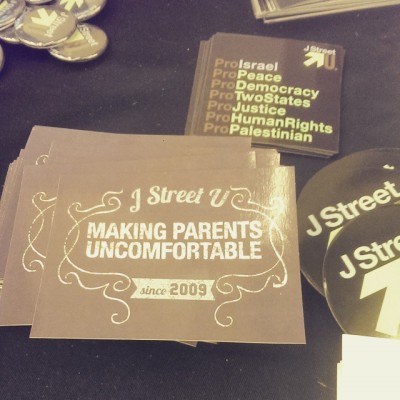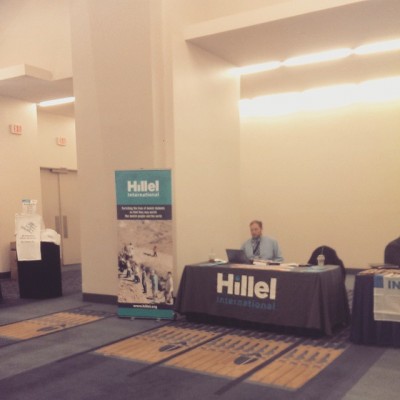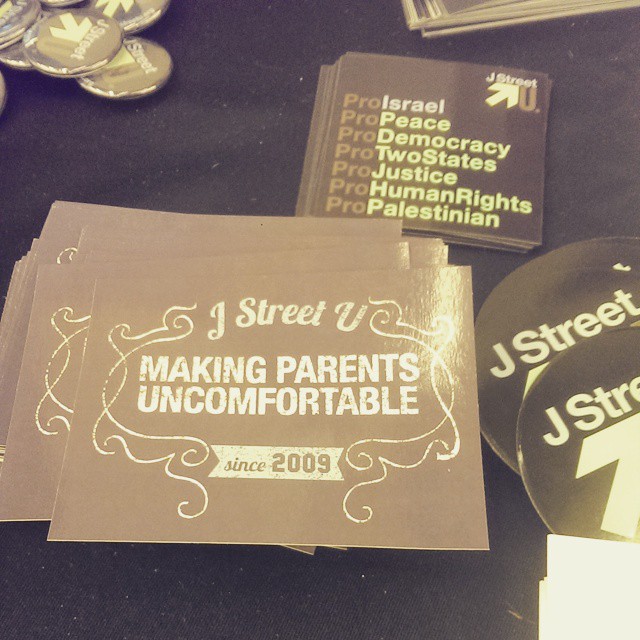
I came to the J Street Conference earlier this week with a question in mind for students: How do you advocate for Israel and for peace on campus after last week’s elections? In true Jewish fashion, their answers went beyond the question to address other important points about Israel advocacy and Jewish life on campus.
Since students at the conference (understandably) tend to move in packs according to schools, most of the random sampling of students I asked responded in groups.
One exception to this was student organizer and soon-to-be New Voices contributor Austin Weisgrau of Reed College in Portland, Ore., who said:
J Street has always been about the long game. We’re really just back to where we were before, this doesn’t actually change anything. This really just opens an opportunity for us to be more explicit about what we’ve wanted all along: We want to change the way Americans talk about Israel. We’re urging organizations to take a hard line against settlements and the occupation.
A group of students from UC Berkeley:
We want to engage the entire community. We do this by hosting open Jewish community events where we can bring in perspective students. We want to bridge differences, show various perspectives, that this is a human issue that can actually bring people together.
When I asked about anti-Semitism in the UC system, they responded:
Three out of 20 of our student senators at Berkeley are Jewish, so [people on campus know that] no one speaks for the entire Berkeley Jewish community. Our J Street tries to unify students. We can unify people, show that we can all contribute. We want to bring in as many people as possible.
People think we’re different, but Berkeley really is no different than many other schools. It’s a microcosm of American universities, really. Anti-Semitism is far from the biggest problem we face.
A group from Vassar College:
Overall, the thing for us is providing a viable alternative to the one-state solution and arguing for it.
When I asked them how they felt about the Eric Fingerhut situation, they said they didn’t even know who he was until I clarified.
We’re surprised by the amount of obsession over him. We have MK’s here, we have heads of NGO’s, we don’t need to go to him here, he needs to come to us.
Similar sentiment seemed to be shared among many students.
A group from Oberlin:
Education is the key. Talking, getting our viewpoint out there. It’s important to stress that being pro-Israel doesn’t mean being anti-Palestinian. There is a big pro-BDS movement on campus, SJP is big here. I wish they would talk to us, or that we could work with them more because we could learn from each other and we want many of the same things. Oberlin Zionists don’t really work with us either and we feel the same way about them. Oberlin can be hostile towards Israel, but there’s factions like anything else.
(Note: Though it might seem like I targeted students from schools with very liberal reputations, I actually didn’t know where any of them were from until we began speaking. It turns out it’s not just me: a quick look at which schools have J Street U chapters bears out my suspicion that small liberal arts schools disproportionally represented in the organization.)
More observations from the conference:
*The atmosphere was surprisingly festive. It turns out, liberal Jews came here to work off their post-election depression; there was even a surge of last-minute sign-ups immediately after the final results came in. People came to become re-energized and refocused, and those energies were palpable.
It is being widely commented upon how a major theme of this year’s conference was J Street taking the gloves off—in the wake of the new difficulties the two-state solution faces, they are no longer interested in apologizing for their leftism or their heavy criticisms of Israel. As Peter Beinart said during a plenary session, “J Street used to have to look over its right shoulder, now it has to look over its left, and that’s a good thing.” Crucially, some of the harshest criticism of Israel and strongest support for J Street’s positions came from liberal MK’s, who seemed to relish the opportunity this conference presented as much as the Americans.
Though part of J Street’s new tactical focus includes a new openness towards supporting Palestinian actions at the UN and stronger calls for a settlement boycott, they are now also focusing at least as much energy on grassroots advocacy within American Jewish communities. As the status-quo threatens to bring Israel further from democracy, J Street is embracing the role of communal agitator, ready to put pressure on any Jewish organization that does not commit to taking tangible steps towards achieving a two-state solution, which it sees as the only viable option for sustaining an Israel that is both Jewish and democratic.
A part of this is their new map campaign calling on Jewish schools, synagogues, and organizations to replace their current maps of the Land of Israel with one including the Green Line. The educational and cultural significance of this move was well-put by previous New Voices Rebbe David A.M. Wilensky in his wonderfully West Wing-centric post “JStreet 2015: Cartography for Social Equality” on Jewschool.
This agitation also includes pressuring Jewish organizations to show greater transparency in how much of their funding goes to settlements and boycotting products and organizations from over the Green Line. J Street is clear that it still has no sympathy for the BDS movement. As Zionist Union MK Stav Shaffir said to great applause, “Supporting BDS supports Netanyahu. They think in a narrative that everyone is against us” and BDS reinforces it.
*Speaking of Jewish organizations, Hillel was, not surprisingly, a popular target. They had a table in the exhibit hall, but few people stopped. David A.M. Wilensky took this picture labelled #pariahstate that went semi-viral at the conference.

Many students I spoke with reported strained relations with their Hillels, but there are notable exceptions. After Eric Fingerhut withdrew, some Hillels increased their conference delegations, which is why the final estimate for students in attendance was closer to 1,100 than the 1,000 originally projected. There were about 900 students at the last conference.
The need for opening dialogue around Israel in Jewish institutions in the wake of the current communal schism was a popular rhetorical point. At the 2013 conference, Open Hillel organizers met at a closed, off-the-record session, but this time they had a booth (that was way busier than Hillel’s) and seemingly everyone was inspired by their lead. J Street co-founder Daniel Levy got it right when he said to great approval while moderating a discussion amongst a very diverse assortment of lefties, “Netanyahu is a gateway drug for open dialogue on Israel.”
The ramifications of this shift were made clearest, though, by a student I overheard talking about how, even though she doesn’t at all support their message and knows it will never happen, she nonetheless thinks her school’s J Street U members should sign a petition to allow JVP inside their Hillel and her friends seemed to agree with her.
*This point can’t be made often or strongly enough: If what the students said above seems to mirror the official J Street line a little too closely, it’s not because they all just believe what the organization tells them, but the exact opposite: A student said J Street developed much of its current objectives and strategies from consulting with J Street U students and observing the work they do on campus. This is most evident in the initiative to follow the money behind occupation, which students are among the most outspoken advocates of. Their struggles with Hillel, of course, make it easy to see why.
*All the above serves to demonstrate my long-held hypothesis that Newton’s third law of motion is really the Jewish world’s first.
Derek M. Kwait graduated from the University of Pittsburgh and is editor in chief of New Voices.

